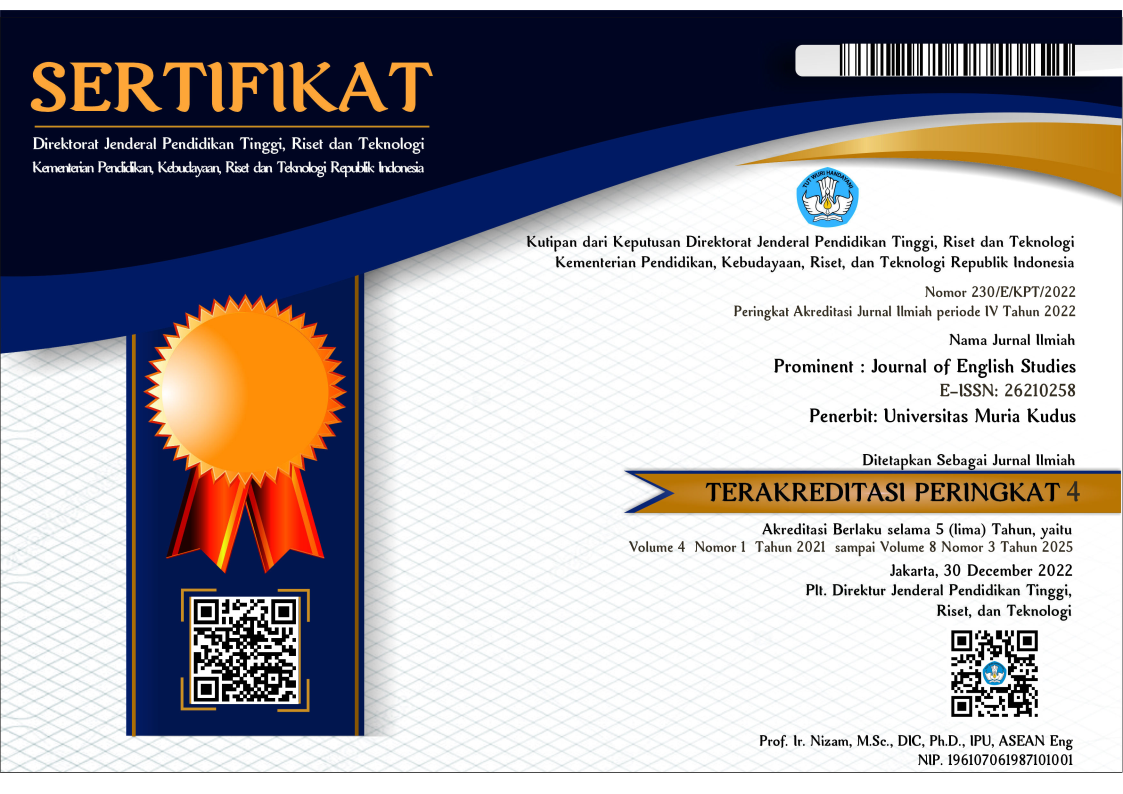Fostering Reading Habit of English Fiction Books to Improve English Vocabulary: Evidence from Students in an Indonesian Higher Education
Abstract
Low English literacy has a major impact on the education sector. In particular, it has an impact on less qualified human resources. This study aims to explore the students’ perception of reading habits on English fiction books to improve English vocabulary in Indonesian higher education. This study used a qualitative case study method. Data were gathered through semi-structured interviews with four students consisting of two female and two male students from the English Education Department. The results of the study reveal that students believe that reading fiction books can help them memorize English vocabulary, and English fiction books can enrich English vocabulary, especially new words. On the other hand, some challenges appear in reading English fiction books. These include the difficulty of understanding unfamiliar words in English fiction books among male students and the need for sufficient time to read English fiction books completely. Finally, the implication of this study was discussed.
Keywords
Full Text:
PDFReferences
Carlson, E., Jenkins, F., Li, T., & Brownell, M. (2013). The interactions of vocabulary, phonemic awareness, decoding, and reading comprehension. Journal of Educational Research, 106(2), 120–131. https://doi.org/10.1080/00220671.2012.687791 Dylman, A. S., Blomqvist, E., & Champoux-Larsson, M. F. (2020). Reading habits and emotional vocabulary in adolescents. Educational Psychology, 40(6), 681–694. https://doi.org/10.1080/01443410.2020.1732874 Erickson, R. C. (1978). Problems in the clinical assessment of memory. Experimental Aging Research, 4(4), 255–272. https://doi.org/10.1080/03610737808257150 Ghalebi, R., Sadighi, F., & Bagheri, M. S. (2020). Vocabulary learning strategies: A comparative study of EFL learners. Cogent Psychology, 7(1). https://doi.org/10.1080/23311908.2020.1824306 Johnson, M. S. (1957). Factors Related to Disability in Reading. Journal of Experimental Education, 26(1), 1–26. https://doi.org/10.1080/00220973.1957.11010581 Kelley, M. F., Roe, M., Blanchard, J., & Atwill, K. (2015). The influence of Spanish vocabulary and phonemic awareness on beginning English reading development: A three-year (K-2nd) longitudinal study. Journal of Research in Childhood Education, 29(1), 42–59. https://doi.org/10.1080/02568543.2014.973127 Konstantakis, N., & Alexiou, T. (2012). Vocabulary in Greek young learners’ English as a foreign language course books. Language Learning Journal, 40(1), 35–45. https://doi.org/10.1080/09571736.2012.658222 Linnakyla¨, P., Malin, A., & Taube, K. (2004). Factors behind low reading literacy achievement. Scandinavian Journal of Educational Research, 48(3), 231–249. https://doi.org/10.1080/00313830410001695718 Mailasari, D. U. (2018). The Analysis Of The Students’ Difficulty In Memorizing English Vocabulary in Elementary School. JETL (Journal Of Education, Teaching and Learning), 1(1), 90–110. Nemati, A. (2009). Evaluation of an ESL English Course Book: A Step towards Systematic Vocabulary Evaluation. Journal of Social Sciences, 20(2), 91–99. https://doi.org/10.1080/09718923.2009.11892726 Nikmah, A. (2020). Improving Student’s Reading Comprehension of Narrative Text Through Directed Reading Think Pair Share (TPS) at Madrasa Aliyah. Journal of English Teaching and Learning Issues, 3(1), 43. https://doi.org/10.21043/jetli.v3i1.7465 Nordlund, M. (2016). EFL textbooks for young learners: a comparative analysis of vocabulary. Education Inquiry, 7(1). https://doi.org/10.3402/edui.v7.27764 Rupley, W. H., & Slough, S. (2010). Building prior knowledge and vocabulary in science in the intermediate grades: Creating hooks for learning. Literacy Research and Instruction, 49(2), 99–112. https://doi.org/10.1080/19388070902780472 Schaefer, J. C., & Paradis, E. (1977). Help the Student with Low Reading Ability. The Journal of Business Education, 52(4), 160–162. https://doi.org/10.1080/08832323.1977.10118230 Tveit, Å. K. (2012). Reading Habits and Library Use Among Young Adults. New Review of Children’s Literature and Librarianship, 18(2), 85–104. https://doi.org/10.1080/13614541.2012.714341 Wahyuningsih, S. (2018a). Challenges and Opportunities of Teaching Academic Writing Skills: A Case Study of Students at IAIN Kudus. Jurnal Edulingua, 5(1), 15–24. Wahyuningsih, S. (2018b). Men and Women Differences in Using Language: A Case Study of Students at STAIN Kudus. Edulite, 3(1), 79–90. Wahyuningsih, S., & Afandi, M. (2020). Investigating English speaking problems: Implications for speaking curriculum development in Indonesia. European Journal of Educational Research, 9(3), 967–977. https://doi.org/10.12973/EU-JER.9.3.967 Wahyuningsih, S., & Afandi, M. (2022). Incorporating English Skills in Blended Learning During the COVID-19 Pandemic: A Narrative Inquiry. Elsya : Journal of English Language Studies, 4(3), 227–239. https://doi.org/10.31849/elsya.v4i3.9902 Wahyuningsih, S., & Novita, F. (2021). Incorporating English Vocabulary Through The Use of Poster Media for Elementary School Students. Edulingua, 8(2), 13–22. Widodo, H. P. (2014). Methodological Considerations in Interview Data Transcription. Journal of Innovation in English Language Teaching and Research, 3(1), 101–109.
DOI: https://doi.org/10.24176/pro.v7i1.10465
Refbacks
- There are currently no refbacks.
Prominent Journal of English Studies is licensed under a Creative Commons Attribution-ShareAlike 4.0 International License.
Dedicated to:

in Collaboration with APSPBI:





